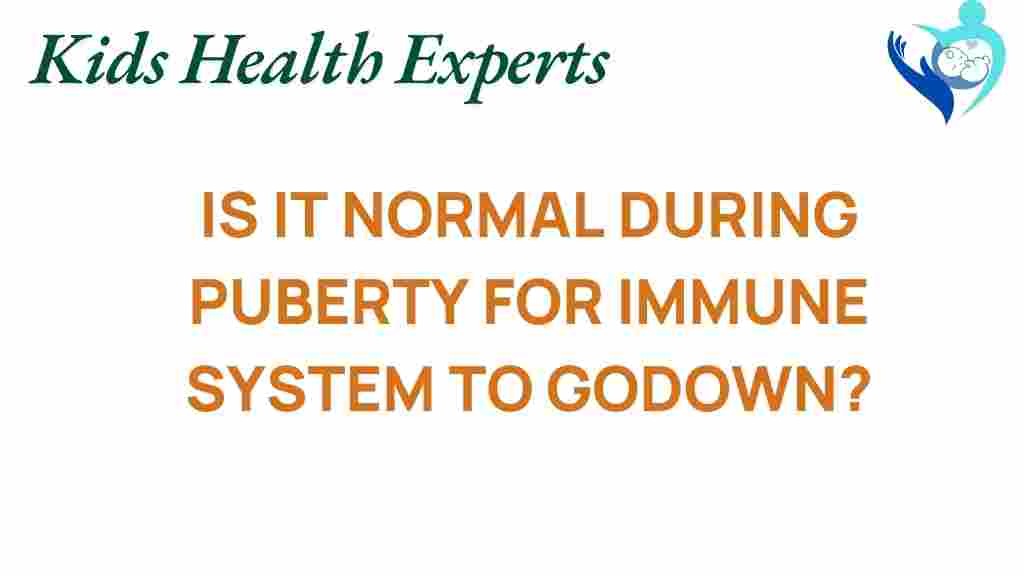Is a Decline in Immunity Normal During Puberty?
Puberty is a significant developmental stage that marks the transition from childhood to adolescence. During this period, various hormonal changes occur that can impact numerous bodily functions, including the immune system. Many parents and adolescents are concerned about whether a decline in immunity during puberty is normal and what health implications this might have. This article aims to unravel the mystery of the immune system during puberty, exploring its effects on adolescent health, the interplay between hormonal changes and immune response, and common health concerns that may arise.
Understanding Puberty and Its Impact on the Immune System
Puberty is characterized by dramatic physical and hormonal changes that typically occur between the ages of 9 and 14 for girls and 10 and 15 for boys. These changes are driven by hormonal shifts, particularly the increase in sex hormones such as estrogen and testosterone. While these hormones are crucial for growth and development, they can also influence the immune system in several ways:
- Increased Vulnerability: Some studies suggest that adolescents may experience a temporary decline in immune function during puberty, making them more susceptible to infections.
- Immune System Recalibration: The body undergoes a “recalibration” phase where it adjusts to new hormonal levels, which can affect the immune response.
- Growth Spurts: Rapid growth during puberty can divert energy and resources away from the immune system, potentially leading to a weakened response.
The Role of Hormonal Changes
The hormonal changes that occur during puberty play a crucial role in the development of the immune system. Here’s how they interact:
- Estrogen: In females, estrogen has been shown to enhance immune function, but fluctuations can lead to periods of vulnerability.
- Testosterone: In males, testosterone can have immunosuppressive effects, potentially leading to a higher risk of infections during certain phases of puberty.
Understanding these interactions is essential for parents and adolescents as they navigate this complex developmental stage. It is important to recognize that while some decline in immune function may occur, it is usually temporary and resolves as the body stabilizes.
Common Health Concerns During Puberty
As adolescents go through puberty, several health concerns may arise related to the immune system and overall health:
- Increased Infections: Adolescents may experience more frequent colds, flu, and other infections during this time.
- Autoimmune Disorders: The onset of certain autoimmune conditions can occur during puberty, especially in genetically predisposed individuals.
- Allergies: New allergies or worsening of existing allergies may emerge during this period.
It’s crucial for adolescents and their guardians to be aware of these potential health issues and to consult healthcare providers when necessary.
Step-by-Step Process: Strengthening the Immune System During Puberty
While a decline in immunity can be a normal part of puberty, there are steps that adolescents can take to strengthen their immune system:
1. Maintain a Balanced Diet
A nutritious diet rich in fruits, vegetables, whole grains, and lean proteins can support overall health and immune function. Key nutrients include:
- Vitamin C: Found in citrus fruits, strawberries, and bell peppers, it helps in the production of immune cells.
- Vitamin D: Important for immune regulation, it can be obtained from sunlight and fortified foods.
- Zinc: Found in meats, shellfish, legumes, and seeds, zinc supports immune cell function.
2. Regular Physical Activity
Engaging in regular exercise enhances overall health and boosts the immune system. Aim for at least 30 minutes of moderate exercise most days of the week.
3. Adequate Sleep
Sleep is essential for a strong immune response. Adolescents should aim for 8 to 10 hours of quality sleep each night to support their health and hormonal balance.
4. Stress Management
High levels of stress can negatively impact the immune system. Techniques such as mindfulness, meditation, and relaxation exercises can be beneficial. Encourage adolescents to find healthy coping mechanisms.
5. Stay Hydrated
Drinking plenty of water is vital for overall health and helps in maintaining optimal immune function.
Troubleshooting Tips for Parents and Guardians
As a parent or guardian, it’s essential to monitor the health of adolescents during puberty. Here are some troubleshooting tips:
- Watch for Symptoms: Keep an eye out for frequent infections, fatigue, or unusual health changes. If these occur, consult a healthcare provider.
- Encourage Open Communication: Create a space for adolescents to discuss their health concerns openly.
- Promote Healthy Habits: Encourage healthy eating, exercise, and sleep routines. Involve them in meal planning and physical activities they enjoy.
- Schedule Regular Check-ups: Routine health check-ups can help monitor growth and overall health during this critical developmental stage.
Conclusion
In conclusion, a decline in immunity during puberty is a normal phenomenon influenced by hormonal changes, growth spurts, and the body’s developmental stages. While adolescents may experience increased susceptibility to infections and other health concerns during this time, there are proactive steps they can take to strengthen their immune response. A balanced diet, regular exercise, adequate sleep, stress management, and proper hydration are essential for maintaining adolescent health.
As parents and guardians, being aware of these changes and encouraging healthy habits can help support adolescents through this transformative period. For more information on adolescent health and immune system support, consider consulting a healthcare professional or visiting reputable health resources. Click here for more information on adolescent health.
Understanding and addressing these aspects of puberty can lead to healthier outcomes and a smoother transition into adulthood. Remember, while challenges may arise, they are often manageable with the right knowledge and support.
This article is in the category Conditions and created by KidsHealthExperts Team
